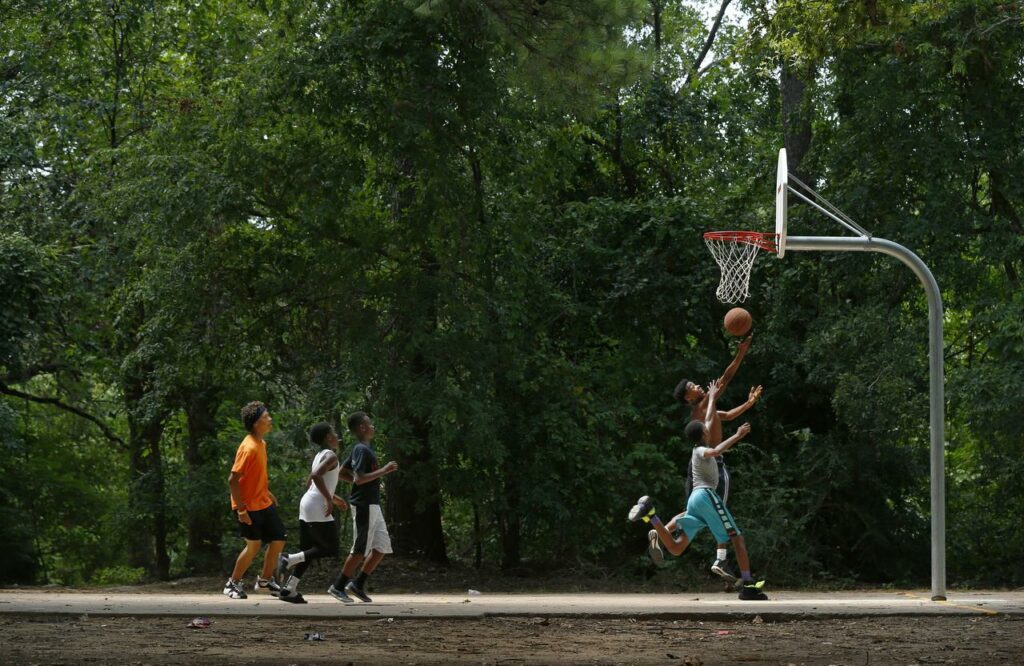
By Hunter Marion.
Nestled between the slow, muddy waters of the Trinity River and the noisy I-45, sits Joppa, TX. Pronounced “Joppee” by locals, Joppa is a neighborhood located at Dallas proper’s southernmost point. It was founded by freed Black people shortly after the abolition of slavery in the 1870’s. Generations of residents lived relatively isolated from the growing metropolis until the town was annexed by the city of Dallas in 1955.
That annexation saw the gradual introduction of industrialization into the formerly forest-covered community. Pacific-Union built a railway cutting through the middle of the neighborhood. Asphalt plants, gravel mills, and landfills quickly ate up the bountiful, green floodplains of the area commonly called the “Bottoms.” Soon enough, Joppa became surrounded by polluting facilities and the refuse of interstate commerce.
Air pollution is the most prevalent problem affecting folks living in Joppa. Companies like Austin Industries, Martin Marietta, and TAMKO produce high amounts of particulate matter (PM) that consistently clog the lungs of locals. In the spring of 2023, air monitoring sensors in Joppa belonging to SharedAirDFW registered air quality that was double the EPA’s healthy standard of PM pollution!
Local organizations like Downwinders at Risk (a Dallas-based environmental organization and former CHEJ grantee) and Paul Quinn College have also reported that Joppa experiences levels of air pollution exceeding that of the rest of Dallas. Findings even cite that the life expectancy of Joppa residents is 13 years less than those living in the affluent Highland Park neighborhood of central Dallas. In addition to industrial contamination, the area is still recovering from the presence and removal of a giant pile of shingle debris called “Shingle Mountain,” which contributed to long-term water and air contamination in Joppa and the nearby neighborhood, Floral Farms.
To combat this issue, Joppa residents have been steadily gaining media attention and political action through grassroots efforts. For instance, in early 2023 residents sought to block the renewal of Austin Bridge & Road’s 10-year “specific-use” permit and protested the presence of a concrete batch plant that was discovered to be in operation without a permit. Local leaders like Alicia Kendrick have been vocal about the industries harming their homes, families, and friends, especially complaining about the EPA and Texas Commission on Environmental Quality’s (TCEQ) lack of enforcement on air quality standards in the area.
A key development in the fight to protect the neighborhood has been the Joppa Environmental Health Project. This is a community-led three-year environmental health study overseen by a research group from Texas A&M University. The project focuses on the effects of PM exposure upon Joppa’s residents. Community members intend to use the findings from this project as leverage against the city council to wrest control of Joppa over from the polluters. Although companies like Austin Industries have been prioritized by Dallas’s city council in the past, Kendrick and others have hope that continued pressure from organizing and research will prevail. They did not have to wait too long for a victory.
In June 2023, the Austin batch plant officially announced its closure and removal from the community. Excited by the victory of her 14-month battle against the company, Kendrick said that she was “determined to see this through, to use this [win] as a first step in giving Joppa residents a neighborhood where the air is safe to breathe.”
